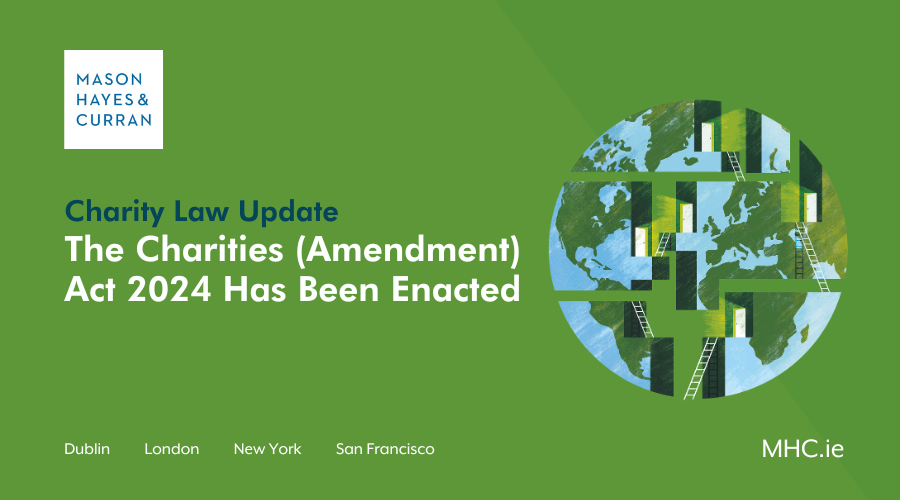The Charities (Amendment) Act 2024 Has Been Enacted
Important update for all charities

The long-awaited Charities (Amendment) Act 2024 has now been enacted and awaits commencement. All Irish charities need to familiarise themselves with the new rules. We consider some of the key highlights of this new Act and how they might impact on charities.
Enactment of the Charities (Amendment) Act 2024 (2024 Act) is the culmination of a lengthy period of pre-legislative scrutiny, followed by six months passing through the Oireachtas. Every stage has involved input and feedback from across the sector. This included a joint submission and appearance before the Oireachtas committee by Charity lawyers from our team, from The Wheel and from Charities Institute Ireland. Now that the 2024 Act has been enacted, it is of critical importance that charity trustees, senior management and anyone advising charities now familiarise themselves with the impact of the changes.
Structure of the new Act
The Charities Act 2009 (2009 Act) has been the principal piece of legislation for charities for almost a decade. The newly enacted Charities (Amendment) Act 2024 does not replace the 2009 Act. Instead, it makes a wide-ranging set of amendments, insertions and repeals of the 2009 Act. 35 separate sections of the 2009 Act are affected by changes in the 2024 Act. These range from registration of new charities to the wind up of charities and many matters that can affect charities in between.
Because of the structure of the 2024 Act, it will be necessary to read across both the 2009 Act and the 2024 Act to have a full understanding of the new laws applying. This is the case with all “amending Acts” but it can cause difficulty for readers. We have prepared an “informal consolidation” which brings together the 2009 Act and inserts into it all the 2024 Act changes, so that we have together in one place the full set of applicable laws. If you would like to receive a copy of this document, please contact a member of our Charity and Not-for-Profit team.
Publication of the official final text of the 2024 Act and the formal bringing into operation of the 2024 Act by way of Ministerial commencement order are awaited, but in the meantime, we set out below some headline points on the core content and amendments.
Financial reporting
The 2024 Act introduces a number of long-anticipated and welcome amendments to the requirements on financial reporting which include:
- For charities that are not companies and have gross income or expenditure not exceeding €250,000, the charity trustees may, instead of preparing an annual statement of accounts, prepare an income and expenditure account and a statement of the assets and liabilities of the charity.
- For charities that are companies, financial statements must be prepared in accordance with the provisions of the Companies Act 2014 and any additional regulations that might be made by the Minister.
- Charities that meet any two of the following conditions are exempt from the requirement to prepare an annual statement of account or an income and expenditure account and statement of assets and liabilities:
- Its balance sheet does not exceed €10,000 or such greater amount not exceeding €50,000 as may be prescribed.
- Its gross income does not exceed €10,000 or such greater amount not exceeding €50,000 as may be prescribed.
- It has no employees.
- Education bodies and centres for education are also exempt from these requirements.
Further amendments have also been made to the requirement for an annual audit or examination of accounts:
- The 2024 Act provides for an increase in the maximum threshold that the Minister may set regarding the requirement to have annual accounts audited. The threshold is now increased to €1 million. This means that the Minister has the scope to provide that all charities with a gross income or total expenditure below €1 million are exempt from the requirement to have their accounts audited. This is an increase from the current maximum threshold of €500,000. Notwithstanding this maximum threshold, the Minister has indicated that his intention is to set the threshold at €500,000. This is an increase from the current threshold prescribed by the Minister of €250,000, which would mean that many more charities will be able to avail of this audit exemption. Any charity above the threshold prescribed by the Minister from time to time will be required to have their accounts audited.
- For charities that fall below the prescribed threshold, the charity trustees have the option to either have the account examined by an independent person, or to have them fully audited.
- Charities that meet two or more of the following conditions will not be required to complete either an audit or an examination of their accounts:
- Its balance sheet does not exceed €10,000 or such greater amount not exceeding €50,000 as may be prescribed.
- Its gross income does not exceed €10,000 or such greater amount not exceeding €50,000 as may be prescribed.
- It has no employees.
- Education bodies and centres for education are also exempt from these requirements.
The 2024 Act does not expressly refer to the Charities SORP although some of the requirements mirror those of the Charities SORP. Both the 2024 Act and the 2009 Act do however give the Minister the power to introduce regulations prescribing the form and content of a charity’s statement of accounts. These regulations may permit the express introduction of Charities SORP as a requirement.
Advancement of human rights as a charitable purpose
In a welcome update, “the advancement of human rights” will be a permitted charitable purpose. The 2024 Act provides that any organisation which becomes a charitable organisation under this heading must apply to the Charities Regulator for registration as a charity no later than 6 months from the commencement of this section, or at a later date as specified by the Minister. Human rights bodies will need to take immediate steps to prepare their applications, as well as apprising themselves appropriately as to the content of the legislation which will now apply to them. They may need to update their governing instruments for example.
Members of a charity
The 2024 Act introduces a new definition of the members of a charity. For charities that are companies, the members are considered to be those persons who are company members within the Companies Act 2014 definition. For charities that are not companies, the members are those with the power to appoint, nominate or vote for the appointment of a person as a charity trustee of that organisation. The Act also requires all charities, regardless of their legal structure, to keep an internal register of members. Previously, charities which were not companies were not required to do so.
It is very important for charities to take the time to look carefully at their governing document to identify precisely who is considered to be a member within the meaning of the 2024 Act. Charities must compile a register of those individuals. There are implications for being a member of a charity and these all need to be carefully considered.
Charity trustee definition
Following refinement of this point during the legislative process, the 2024 Act now clarifies that a secretary, including a company secretary, is not considered to be a charity trustee. This is the case unless they also happen to be a member of the board or governing body, whether formally appointed or not. The 2024 Act’s definition includes where they might act in a capacity similar to a “shadow director” in company law. This is a very positive change for secretaries, who were previously considered to be charity trustees. Note that this change may mean that you need to update your register of charity trustees.
Duties of charity trustees
The 2024 Act sets out a clear statement of the duties of charity trustees, echoing principles already well established in Charities Regulator guidance and common law. These should be consulted closely by all charity boards.
Constitutional amendments
The 2024 Act now enshrines the Charities Regulator’s recently adopted practice regarding the types of constitutional amendments that will require the Charities Regulator's approval. These include changes to a charity’s: name, objects, charitable purpose, income and property clause, and winding up clause. It is worth noting that breach of this requirement will be an offence and may also result in the charity being deregistered. This is a positive development for the many charities who only wish to make minor or governance type amendments and who previously had waited for extended periods for these to be considered and adjudicated by the Charities Regulator.
Mandatory notifications to the Charities Regulator
The 2024 Act introduces mandatory written notification to the Charities Regulator, which is a significant amendment and one which all charities need to be aware of. Matters which will be subject to notification include where:
- The charity breaches a condition of its registration
- Information on the Register of Charities ceases to be correct
- Information provided in an application for registration regarding a charity trustee ceases to be correct
- It is proposed to wind up the charity and
- There is a resignation or appointment of a charity trustee.
Failure to notify the Charities Regulator is an offence on the part of the charity trustees and the charity where it is a body corporate.
It had initially been proposed that charities would be required to notify the Charities Regulator of the occurrence of a “significant event”. That requirement was ultimately not included in the 2024 Act. However, the 2024 Act does permit the Charities Regulator to introduce guidelines or codes of conduct relating to “procedural requirements in relation to the occurrence of a significant event”. A “significant event” is defined as:
- Substantial damage to property
- A substantial reduction or loss in assets, or
- An event or situation that places the charitable organisation or its reputation at significant risk.
It does not include a matter which is notifiable under section 59(1) of the 2009 Act. This is the obligation to notify the Charities Regulator where there are reasonable grounds for believing that an offence under the Criminal Justice (Theft and Fraud Offences) Act 2001 has been or is being committed.
While guidelines or codes of conduct are not equivalent to legal obligations, the 2024 Act does provide that charities and charity trustees “shall have regard” to them. Therefore, there will be an expectation that charities would take on board the contents of any such guidelines or codes of conduct.
Agreements and appointments
The new rules on agreements and appointments are likely to be of significant interest to the sector and will impact on many. They are intended to regulate the interactions and specifically the payment of remuneration, which is very broadly defined, by a charity to its charity trustees, its members and persons with whom its charity trustees have a personal connection.
At an earlier stage in the development of the Bill, there were provisions which would have required a charity to seek the Charities Regulator's consent to certain agreements and appointments. However, following commencement of the 2024 Act, charities may now enter into these agreements and appointments where certain conditions are met, without seeking the prior approval of the Charities Regulator. The conditions set out in the 2024 Act are specific and merit close attention by any charity which is considering entering into an agreement or appointment.
A charity may not enter into these agreements if it would go against its governing document. The charity trustees must also be satisfied that it is in the best interests of the charity to do so. A declaration to this effect must be included in the charity’s annual return for the year the agreement or appointment is made. The Minister may specify certain circumstances where appointments can be made. It is also worth noting that there are certain exemptions from some of the provisions relating to agreements and appointments for education bodies and public bodies.
Breach of these requirements relating to any agreement or appointment will mean that the agreement or appointment in question is null and void, and the charity trustees shall be guilty of an offence.
We feel that agreements with members of a charity will need to be the most closely scrutinised, since some charities have very large numbers of members, and agreements with these members were not previously subject to specific regulation in this manner.
Deregistration of charities
Much concern was expressed in the sector over the potential for a charity to be deregistered for lesser breaches of the proposed provisions when the 2024 Act was at its Heads of Bill stage, with devastating consequences for the beneficiaries and employees of that charity. The 2024 Act however introduces a new framework requiring High Court approval in the vast majority of instances before a charity can be deregistered. Although this is a positive change from the position earlier in the legislative process, charities still need to pay close attention to these sections.
Next steps
These are a selection of some of the new features of the 2024 Act. Charity trustees and their senior management should take the time to become familiar with the various provisions of the 2024 Act and how they will impact on the governance of their charities.
Should you require any advice on the provisions of the 2024 Act, please get in touch with a member of our Charity and Not-for-Profit team.
The content of this article is provided for information purposes only and does not constitute legal or other advice.
People also ask
What is a charity in Irish law? |
A charity is an organisation that meets the definition of “charitable organisation” in the Charities Act 2009, as amended by the Charities (Amendment) Act 2024. It is a requirement for all organisations that meet this definition to apply for registration as a charity. |
What are the rules for a charity? |
The Charities Act 2009, as amended by the Charities (Amendment) Act 2024, sets out the main legal obligations specific to charities under Irish law. Charities are also subject to other legal obligations depending on the nature of their work, such as employment law, GDPR, Health & Safety etc. |
Share this:



